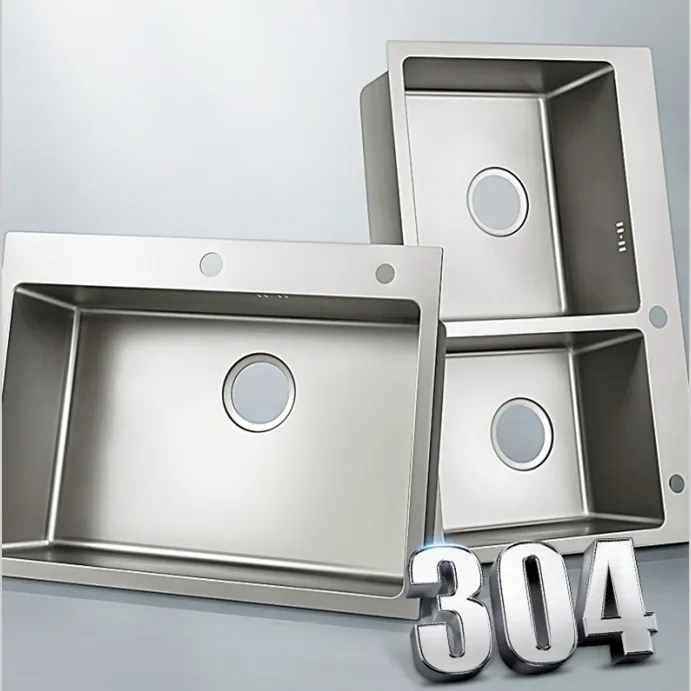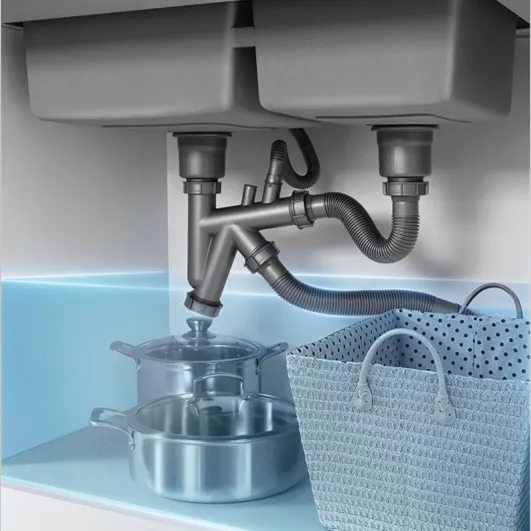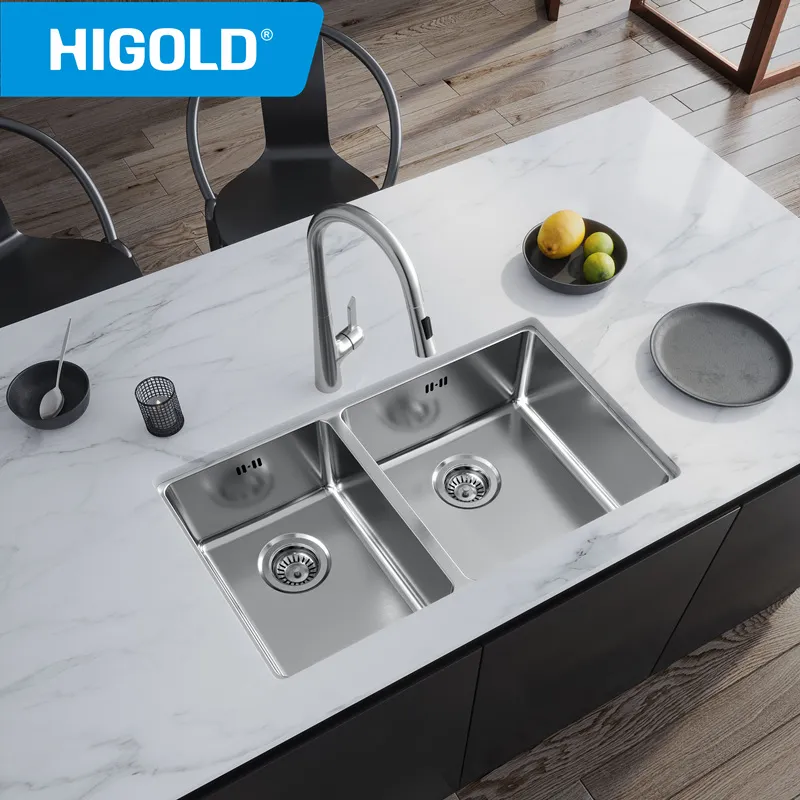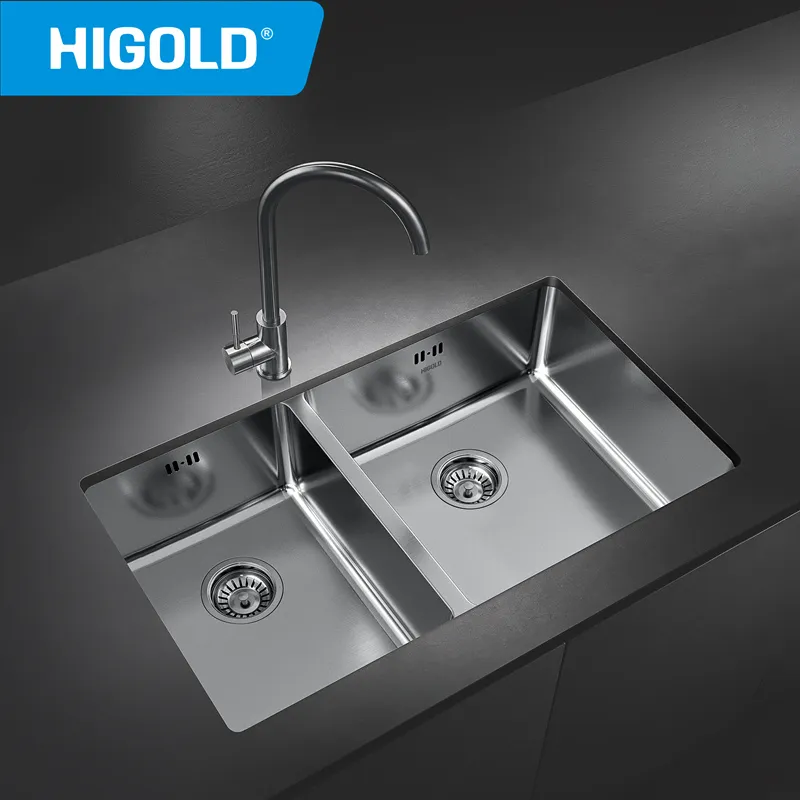In home kitchens, stainless steel sinks are one of the most common choices. They are widely used in various kitchen designs due to their durability, hygiene and modern appearance. Stainless steel sinks have become the first choice for many families because of their advantages such as being less susceptible to corrosion and strong anti-fouling ability. However, many people encounter a common problem when using stainless steel sinks - water stains. Water stains not only affect the appearance of the sink, but may also affect its durability in long-term use.
So, do all stainless steel kitchen sinks have water stains? How do water stains occur, and how can they be effectively avoided and cleaned? This article will explore this issue in detail, analyze the factors that affect the generation of water stains in sinks, and provide effective solutions.

What are the characteristics of stainless steel sinks?
Stainless steel sinks are favored by kitchen decoration designs because of their sturdy material. It has strong durability and can withstand high temperatures and erosion by various kitchen acids and alkalis. The problem of "water stains" usually occurs when the water evaporates or remains on the surface of the sink after using it, causing minerals or impurities in the water to accumulate on the metal surface, forming spots that are difficult to clean.
What causes water stains?
Water stains refer to the marks left when the minerals, calcium, magnesium, iron and other substances in the water come into contact with the stainless steel surface and evaporate. These marks usually appear in the form of water spots, hard water stains or water marks, usually white or transparent spots. Especially in hard water areas, the mineral content in the water is high, and the water stain problem is particularly serious.
1. Causes of water stains
The generation of water stains on stainless steel kitchen sinks is related to multiple factors, mainly including water quality, frequency of use, cleaning methods, etc. Specifically:
·Hard water problem: Hard water contains more minerals such as calcium and magnesium, which will leave marks on the surface of the sink. After the water evaporates, these minerals will form water stains, especially when using stainless steel sinks in hard water areas, the water stain problem is more serious.
· Frequency of use and cleaning habits: If the stainless steel kitchen sink is exposed to water for a long time and is not wiped dry in time, water stains will easily form. In addition, if the cleaning work is not done properly, the water stains remaining on the surface of the sink will gradually become more difficult to clean.
· Surface treatment of the sink: The surface treatment method of the stainless steel sink will also affect the formation of water stains. Different surface treatment methods such as polishing and brushing will affect whether the sink surface is easy to adhere to water stains.
2. The relationship between water stains and the material of the sink
Not all stainless steel kitchen sinks will have water stains. Although stainless steel materials are common in sink manufacturing, different types of stainless steel sinks may have differences in surface treatment and stain resistance. For example, some stainless steel sinks use a more refined polishing process, which can effectively prevent the attachment of water stains. On the contrary, stainless steel sinks with rougher surface treatment are more likely to absorb water stains.

The relationship between hard water and water stains
Hard water is one of the important factors that cause water stains on stainless steel sinks. Hard water refers to water containing more dissolved minerals, especially calcium and magnesium salts. When hard water flows through a stainless steel sink, the minerals in the water will be deposited on the surface of the sink, and water stains will form after the water evaporates. If these water stains are not cleaned in time, they may become more stubborn over time and affect the appearance of the stainless steel kitchen sink.
1. Impact of hard water areas
In some hard water areas, the mineral concentration in the water is high, and a large number of water stains will appear in sinks that use this water quality for a long time. These water stains not only affect the appearance of the kitchen sink, but may also cause scratches or corrosion on the surface of the sink, reducing the service life of the sink. Therefore, the impact of hard water on stainless steel sinks is obvious, and the appearance of water stains is almost inevitable.
2. Soft water alternatives
If the water quality in your area is hard, you can consider using a water softener to reduce the mineral content in the water, thereby reducing the occurrence of water stains. The water softener effectively prevents the formation of water stains and prolongs the service life of the stainless steel sink by removing minerals such as calcium and magnesium in the water.
Will all stainless steel sinks have water stains?
Not all stainless steel sinks will have water stains. The occurrence of water stains is affected by multiple factors. In addition to water quality, the surface treatment process, usage and cleaning habits of stainless steel sinks will also affect the formation of water stains to a certain extent.
1. The effect of surface treatment on water stains
The surface treatment process of stainless steel kitchen sinks will affect the adhesion of water stains. For example, the surface of stainless steel sinks that have been finely polished is smooth, and it is more difficult for water to adhere, so water stains are not easy to form. The surface of brushed and frosted sinks is relatively rough, and water and impurities are more likely to adhere, and the formation of water stains is more obvious.
2. The effect of usage habits on water stains
If the user can wipe the water on the surface of the sink in time after using the sink and reduce the residence time of water on the stainless steel sink, the probability of water stains will be greatly reduced. Therefore, timely cleaning the water on the surface of the sink and dry wiping is an effective way to reduce the formation of water stains.
3. Differences in water quality
Even in hard water areas, not all stainless steel sinks will form water stains. Some sinks that have undergone special surface treatment, such as sinks with waterproof and anti-fouling functions, have low adhesion of water stains, which can effectively reduce water stains even in hard water environments.

How to effectively prevent and clean water stains on sinks?
For many families, water stains are often unavoidable, especially in hard water areas. Although water stains may appear on the surface of a stainless steel kitchen sink, scientific cleaning methods and daily maintenance can effectively reduce the impact of water stains on the appearance of the sink.
1. Keep the sink dry
The simplest and most effective way to prevent water stains is to wipe the sink surface dry after using it. You can use a clean cloth or paper towel to wipe the sink surface dry, which can reduce the time that water is in contact with the sink surface, thereby effectively reducing the formation of water stains.
2. Clean the sink regularly
Cleaning the kitchen sink regularly and using a cleaner suitable for stainless steel can remove water stains and stains on the sink surface. For stubborn water stains, you can choose a water stain remover that does not contain bleach, or use a stain removal product specifically for water stains.
3. Soften the water quality
If the water quality is hard, consider installing a water softener to reduce the concentration of minerals in the water, thereby reducing the formation of water stains. A water softener can effectively reduce the content of minerals such as calcium and magnesium in water, thereby preventing these minerals from leaving water stains on the surface of stainless steel sinks.
4. Use a waterproof and anti-sewage sink
Nowadays, some stainless steel kitchen sinks use a special anti-stain and waterproof coating during the manufacturing process, which can effectively prevent the formation of water stains. If the water quality at home is hard or it is inconvenient to clean frequently, this waterproof and anti-sewage sink may be a good choice.

Is Higold a reliable kitchen sink supplier for international distributors?
Absolutely. With over 7 years of continuous collaboration with global retail chains like Costco and distribution in more than 86 countries, Higold has earned a reputation as a dependable manufacturer and exporter. The company’s large production capacity, efficient digital factory management, and certified products make it an ideal supplier for businesses seeking consistent quality and on-time delivery.


